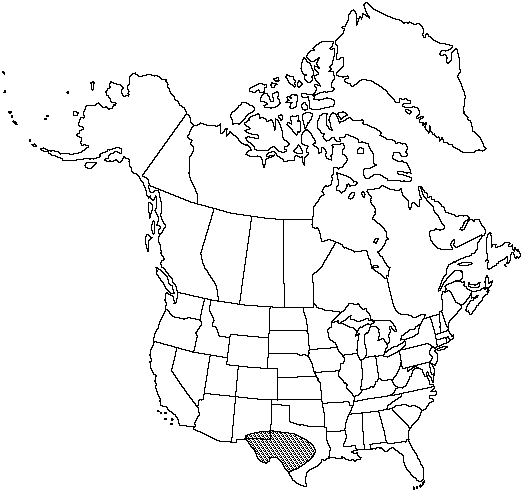Difference between revisions of "Argyrochosma microphylla"
Amer. Fern J. 77: 40. 1987.
FNA>Volume Importer |
imported>Volume Importer |
||
| (7 intermediate revisions by 2 users not shown) | |||
| Line 7: | Line 7: | ||
|year=1987 | |year=1987 | ||
}} | }} | ||
| − | |basionyms={{Treatment/ID/ | + | |basionyms={{Treatment/ID/Basionym |
|name=Pellaea microphylla | |name=Pellaea microphylla | ||
|authority=Mettenius ex Kuhn | |authority=Mettenius ex Kuhn | ||
| + | |rank=species | ||
| + | |publication_title=Linnaea | ||
| + | |publication_place=36: 86. 1869 | ||
}} | }} | ||
|synonyms={{Treatment/ID/Synonym | |synonyms={{Treatment/ID/Synonym | ||
|name=Cheilanthes parvifolia | |name=Cheilanthes parvifolia | ||
|authority=(R. M. Tryon) Mickel | |authority=(R. M. Tryon) Mickel | ||
| − | }}{{Treatment/ID/Synonym | + | |rank=species |
| + | }} {{Treatment/ID/Synonym | ||
|name=Notholaena parvifolia | |name=Notholaena parvifolia | ||
|authority=R. M. Tryon | |authority=R. M. Tryon | ||
| + | |rank=species | ||
}} | }} | ||
|hierarchy=Pteridaceae;Argyrochosma;Argyrochosma microphylla | |hierarchy=Pteridaceae;Argyrochosma;Argyrochosma microphylla | ||
| Line 25: | Line 30: | ||
}}<!-- | }}<!-- | ||
| − | --><span class="statement" id="st- | + | --><span class="statement" id="st-undefined" data-properties=""><b>Stem </b>scales brown. <b>Leaves</b> 7–25 cm. <b>Petiole</b> brown, 0.75–1.5 mm diam. <b>Blade</b> deltate to ovate, 3–4-pinnate proximally, leathery, abaxially and adaxially glabrous; rachis flattened or shallowly grooved adaxially. <b>Pinna</b> costae straight to somewhat flexuous, branches rarely arising from prominent angles. <b>Ultimate</b> segments articulate, dark color of stalks stopping abruptly at segment bases; segment margins recurved to revolute, often concealing sporangia; veins obscure adaxially. <b>Sporangia</b> submarginal, borne on distal 1/3 of secondary veins, containing 64 spores. <b>2n</b> = 54.</span><!-- |
-->{{Treatment/Body | -->{{Treatment/Body | ||
| + | |phenology=Sporulating summer–fall. | ||
|habitat=Rocky limestone hillsides and cliffs | |habitat=Rocky limestone hillsides and cliffs | ||
|elevation=300–2100 m | |elevation=300–2100 m | ||
|distribution=N.Mex.;Tex.;n Mexico. | |distribution=N.Mex.;Tex.;n Mexico. | ||
| − | |discussion=<p>Argyrochosma microphylla is probably the most distinctive species of Argyrochosma in the flora. Chromosome studies by I. W. Knobloch et al. (1973) suggest that it may include diploid and tetraploid cytotypes.</p> | + | |discussion=<p><i>Argyrochosma microphylla</i> is probably the most distinctive species of <i>Argyrochosma</i> in the flora. Chromosome studies by I. W. Knobloch et al. (1973) suggest that it may include diploid and tetraploid cytotypes.</p> |
|tables= | |tables= | ||
|references= | |references= | ||
| Line 40: | Line 46: | ||
-->{{#Taxon: | -->{{#Taxon: | ||
name=Argyrochosma microphylla | name=Argyrochosma microphylla | ||
| − | |||
|authority=(Mettenius ex Kuhn) Windham | |authority=(Mettenius ex Kuhn) Windham | ||
|rank=species | |rank=species | ||
| Line 47: | Line 52: | ||
|basionyms=Pellaea microphylla | |basionyms=Pellaea microphylla | ||
|family=Pteridaceae | |family=Pteridaceae | ||
| + | |phenology=Sporulating summer–fall. | ||
|habitat=Rocky limestone hillsides and cliffs | |habitat=Rocky limestone hillsides and cliffs | ||
|elevation=300–2100 m | |elevation=300–2100 m | ||
| Line 54: | Line 60: | ||
|publication year=1987 | |publication year=1987 | ||
|special status= | |special status= | ||
| − | |source xml=https:// | + | |source xml=https://bitbucket.org/aafc-mbb/fna-data-curation/src/2e0870ddd59836b60bcf96646a41e87ea5a5943a/coarse_grained_fna_xml/V2/V2_142.xml |
|genus=Argyrochosma | |genus=Argyrochosma | ||
|species=Argyrochosma microphylla | |species=Argyrochosma microphylla | ||
| − | |||
| − | |||
| − | |||
| − | |||
| − | |||
| − | |||
| − | |||
| − | |||
| − | |||
| − | |||
| − | |||
| − | |||
| − | |||
| − | |||
| − | |||
| − | |||
| − | |||
| − | |||
| − | |||
| − | |||
| − | |||
}}<!-- | }}<!-- | ||
-->[[Category:Treatment]][[Category:Argyrochosma]] | -->[[Category:Treatment]][[Category:Argyrochosma]] | ||
Latest revision as of 21:21, 5 November 2020
Stem scales brown. Leaves 7–25 cm. Petiole brown, 0.75–1.5 mm diam. Blade deltate to ovate, 3–4-pinnate proximally, leathery, abaxially and adaxially glabrous; rachis flattened or shallowly grooved adaxially. Pinna costae straight to somewhat flexuous, branches rarely arising from prominent angles. Ultimate segments articulate, dark color of stalks stopping abruptly at segment bases; segment margins recurved to revolute, often concealing sporangia; veins obscure adaxially. Sporangia submarginal, borne on distal 1/3 of secondary veins, containing 64 spores. 2n = 54.
Phenology: Sporulating summer–fall.
Habitat: Rocky limestone hillsides and cliffs
Elevation: 300–2100 m
Distribution

N.Mex., Tex., n Mexico.
Discussion
Argyrochosma microphylla is probably the most distinctive species of Argyrochosma in the flora. Chromosome studies by I. W. Knobloch et al. (1973) suggest that it may include diploid and tetraploid cytotypes.
Selected References
None.